
I'LL NEVER FORGET OL' WHATISNAME:
A TRIBUTE TO CHARACTER ACTORS
john cribbs
PAT HINGLE
page 2
THE STRANGE ONE (1957)
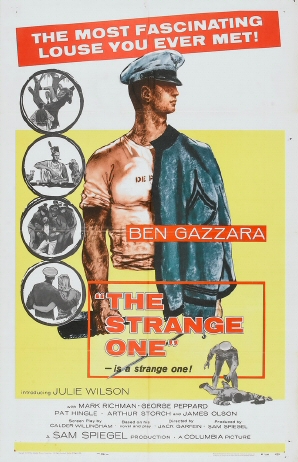 The Strange One is a strange title. It doesn't really capture the feel of the film it sounds more like a B-movie than the sort of high-minded theatrical adaptation the movie's trying to be. It's not even like Melville's Les enfants terribles, which was called The Strange Ones in its first American release: that title reflected
other characters' perceptions of the children in the movie. Here, Ben Gazzara plays Jocko DeParis, a self-described Machiavellian schemer who abuseshis position as a senior cadet at a Citadel-esque Southern military school, torturing underclassmen (psychologically and through standard hazing) and setting up his enemies. His framing of another cadet that results in the young man's expulsion and the rising guilt of those under his thumb serves as the main story but it's never revealed why he'd be considered a "strange
one." He's a bully whose charming manipulations either bring fellow students under his spell orintimidate them into submission;eventually the less-gullible cadets turn against him and bring about his downfall, but despite what all this says about Jocko nobody seems to consider him strange. So the title's a little weird
The Strange One is a strange title. It doesn't really capture the feel of the film it sounds more like a B-movie than the sort of high-minded theatrical adaptation the movie's trying to be. It's not even like Melville's Les enfants terribles, which was called The Strange Ones in its first American release: that title reflected
other characters' perceptions of the children in the movie. Here, Ben Gazzara plays Jocko DeParis, a self-described Machiavellian schemer who abuseshis position as a senior cadet at a Citadel-esque Southern military school, torturing underclassmen (psychologically and through standard hazing) and setting up his enemies. His framing of another cadet that results in the young man's expulsion and the rising guilt of those under his thumb serves as the main story but it's never revealed why he'd be considered a "strange
one." He's a bully whose charming manipulations either bring fellow students under his spell orintimidate them into submission;eventually the less-gullible cadets turn against him and bring about his downfall, but despite what all this says about Jocko nobody seems to consider him strange. So the title's a little weird
The film reminded me of Roger Corman's Sorority Girl from the same year, which I'd just watched recently for a Susan Cabot tribute. Sure enoughit turns out Calder Willingham's novel and play End as a Man served as a source for both films. Willingham* also wrote the screenplay for Strange One; not surprisingly Corman** not only neglected to credit the original source in his version (which he relocated to a sorority and cleansed of all homosexual subtext), he alsogot rid ofthe original title: The Bad One. Hm... that title would work well for either movie.
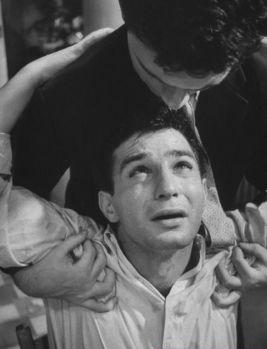 Director Jack Garfein seems like an interesting guy: an Auschwitz survivor, he refused to cut thefinal scene when the studio objected to having black actors appear in the film. He only made one other movie, 1961's Something Wild, about a rape victim held captive by a man who saved her from suicide (sort of an earlier version of Black Snake Moan possibly?) Risque
material for the period I wonder why he stopped making movies (he may have gone on to focus on theater.) The Strange One is as well-directed as this kind of stagey, melodramatic, late 50's hot topic movie could possibly be; I'm actually surprised that it wasn't made by Elia Kazan. It's beautifully shot by Burnett Guffey, responsible for lighting such outstanding genre films as Jacques Tourneur's Nightfall andDon Siegel's Private Hell 36 (he also won Oscars for From Here to Eternity
and Bonnie and Clyde, and shot two of the Nicolas Ray films recently reviewed by Christopher Funderburg as part of our Second Chances project.)
Director Jack Garfein seems like an interesting guy: an Auschwitz survivor, he refused to cut thefinal scene when the studio objected to having black actors appear in the film. He only made one other movie, 1961's Something Wild, about a rape victim held captive by a man who saved her from suicide (sort of an earlier version of Black Snake Moan possibly?) Risque
material for the period I wonder why he stopped making movies (he may have gone on to focus on theater.) The Strange One is as well-directed as this kind of stagey, melodramatic, late 50's hot topic movie could possibly be; I'm actually surprised that it wasn't made by Elia Kazan. It's beautifully shot by Burnett Guffey, responsible for lighting such outstanding genre films as Jacques Tourneur's Nightfall andDon Siegel's Private Hell 36 (he also won Oscars for From Here to Eternity
and Bonnie and Clyde, and shot two of the Nicolas Ray films recently reviewed by Christopher Funderburg as part of our Second Chances project.)
Speaking of Kazan, this film was Hingle's first credited role after appearing in a small bit as the bartender who hassles Brando about his old fighting style in the director's On the Waterfront - Hingle'd have a bigger part as Ace Stamper in his Splendor in the Grass. In The Strange One he's got a handful of key scenes as Harold Koble, Jocko's roommate and snickering toadie. If the title actually is a reference to one character's perception, it could be argued that Harold is the one who starts to see Jocko in a less enthusiastic light. At the beginning of the movie he's having as much fun as his buddy tormenting two freshmen in their room, ordering them to point their chests "to the at-mos-fear!" in a playful Southern draw that works perfectly with the actor's naturally languorous voice. After the framing of the cadet Harold begins to realize that his roommate's motivations go beyond the adolescent display of power and innocent harrassment, and his testimony leads to DeParis being forced out of town by his fellow cadets. Hingles pained expression as Gazzara is led to his fate (he can't help but feel guilty one way or the other!) is as seering as his farewell to the doomed sadist: "Jocko, I still think you got quite a sense of humor but you're about the lowest darn creature I ever seen in my life," a damning line of dialog similar to Barboura Morris' dismissal of Susan Cabot as "something the sea cast out" in Sorority Girl.
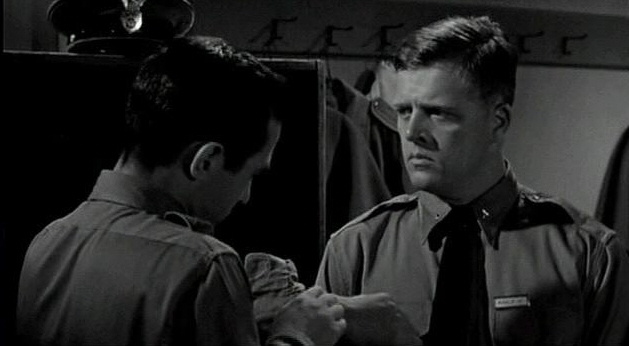
Unfortunately, Hingle's very good yet brief performance is nearly drowned out by two excruciatingly embarrassing acting jobs from his fellow cast members. Arthur Storch (who with buzz cut and thick glasses looks more like an Arthur Storch than anyone I've ever seen) plays the put-upon freshman targeted by DeParis because of his moral mulishness and social retardation.Apparently, the only word Storch cares about in that characterization is "retarded" based on his flagrantly over-the-top behavior. You really want to see this guy get the code red treatment: his physical flamboyance and overemphasizing of lines in an awkward intonation suggests Jerry Lewis with dentures too big for his mouth.Storch makes Larry "Danny in Invasion of the Body Snatchers" Gates' scene as a stuttering drunk officer seem absolutely nuanced.He went on to play the psychiatrist in The Exorcist but nothing else noteworthy on the big screen, thankfully.
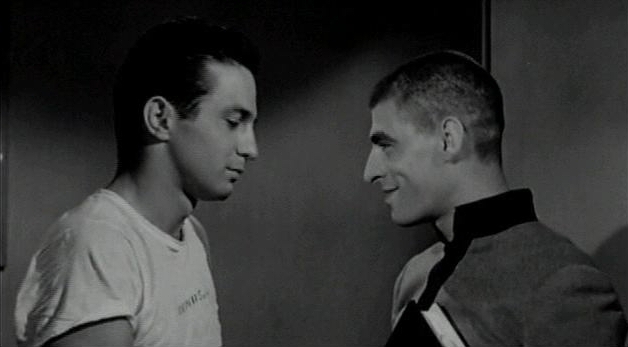
The second awful performance is from Paul E Richards, who ina ridiculous subplot plays an off-putting DeParis groupie and all-around oddball (the "strange one" of the title?) His adoration comes pouring out in a not-very-subtle sequence where he threatens to expose Gazzara (who plays the scene in a tight tanktop while fiddling with his "sword") if he doesn't indulge his obsession. Richards plays the scene - and I'm not exaggerating - exactly like a wily Tennessee Williams heroine, complete with Southern lisp and delicate swish of the hips. All he's missing is a decorative hand fan to cool the vapors as he pontificates towards Mr. DeParis, if you please. This is Richards' only credited film role, and it's not hard to see why. The scene was originally removed from the film due to its homosexual subtext (I say "subtext" but it's honestly as subtle as getting a dick slapped in your face on the subway), or maybe because it was just so plainly awful. There's progress, and then there's depicting a gay character as a lithe, ultra-creepy blackmailer with ogling molester eyes. Even if his character is meant to symbolize Gazzara's self-hatred for his own latent sexuality it's a ridiculous scene and an awful performance, especially beside the skilled acting of Gazzara and Hingle***.
NEVADA SMITH (1966)
All the great character actors punched in at clocks on the sets of Hollywood westerns (and western TV shows) and Hingle was no exception. Two years before siding up to Clint in Hang Em High, he turned up in this flawed but interesting revenge yarn. Despite looking about as Native American as Suzanne Pleshette, Steve McQueen plays a half-Indian white man named Max Sand who seeks vengeance after his farmer parents are set upon by a trio of vicious character actors in Henry Hathaway's prequel to The Carpetbaggers (which was filmed two years earlierby Edward Dmytryk.)
In another Calder Willingham-related coincidence, this film has a lot in common with Marlon Brando's One-Eyed Jacks co-written by Willingham including the usually sweet-natured Karl Malden playing the target of the hero's retribution. Although he and his two buddies (Martin Landau and Arthur Kennedy) are first seen beating an unarmed man andraping his wife, when he shows up later in the movie he plays the villain as a hilarious existential wreck. He knows McQueen is after him, knows what he looks like from wanted posters, yet when Max Sand makes the ballsy play of joining the gang under the pseudonym "Nevada Smith" - he drives himself crazy trying to prove that this guy is actually Sand. In the funniest instance he's giving his gang the lowdown on an ambush they're about to commit when he just suddenly shouts "Max Sand!" at them. McQueen doesn't react, and the outlaws look at him like he's lost his mind.
"He doesn't kill people he executes them! Yeah, he executes 'em!"
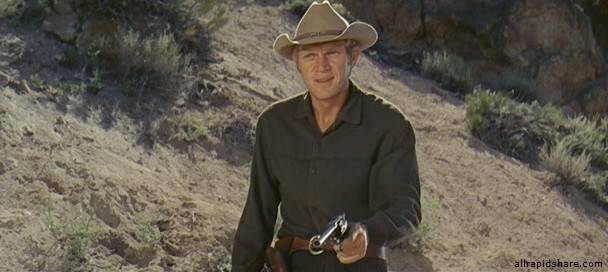
Hathaway, veteran of numerous western and war films, is a superb action director, hence True Grit's most memorable scene where John Wayne's Rooster Cogburn rides into the fray blasting away with a rifle in each hand, or the iconic moment of Widmark pushing the wheelchair-bound Mildred Dunnock down the stairs from Kiss of Death. As such, the action scenes in Nevada Smith are abrupt and intense, from a knife fight with Landau between rampaging cattle to a shootout in the bayou with Arthur Kennedy where McQueen emerges from the swamp with gun in hand, a vengeful wraith rising from the murky depths. In that respect, the movie lives up to Michael Herr's description of it in Dispatches: "McQueen working through a hard-revenge scenario, riding away at the end burned clearn but somehow empty and old too, like he'd lost his margin for regeneration through violence." Not so much Hathaway's love scenes, which are as artificial as the most dated of Hollywood melodramas.
In the middle of the movie, McQueen learns that one of his targets (Kennedy) is incarcerated in a Southern prison on the Louisiana bayou so he robs a bank and gets himself captured on purpose to infiltrate the chain gang. Hingle comes into the movie as Big Foot, a trusteein charge of giving orientation to new prisoners and, I guess,disciplining inmates in need of a good whuppin'. Although the warden appears sadistic in welcoming McQueen and theres a good amount of punishment handed out to disobedient inmates, it's actually not too bad: not only is Hingle an easy-going foreman, the prisoners get lots of outside air, theres plenty of work for everybody and even a program that allows women to come to the prison barracks after hours as an unbelievably awesome fringe benefit. McQueen plots with one of these women, Suzanne Pleshette, to escape with Kennedy so that he can a) kill him and b) you know, escape.
I've got to call Sand/Smith out on something: his vengeance is not only self-serving, it's also unnecessarily selfish. In flushing Landau out behind a herd of cattle, he lets the cows out and they scatter that's going to be a full day of gathering cows for whoever owns them. Then by using Pleshette to help him escape the prison, he's basically making sure the remaining prisoners never get conjugal visits ever again. Thanks a lot McQueen, you asshole! Life is going to suck even more for them now. Suzanne Pleshette's dead in the swamp of a snake bite, she's just more collateral damage to him. And poor Big Foot... not only does the warden threaten to make him serve out the rest of Sand's sentence if he doesn't bring him back (can he do that?), Hingle is just going to be a broken man after this. In his last scene he makes a Javert-style vow to bring McQueen to justice, but that's the last we see of him (a shame his character was interesting enough that a final scene between the two of them would have been exciting.)
On top of all thatMcQueen lets the outlaw gangbushwhack and slaughter a bunch of innocent trailblazers BEFORE going after Malden. There's no advantage for him to wait out the ambush, he just twiddles his thumbs until after it's all over. All this and then he lets Malden live. What a dick. I don't know about this "Nevada Smith" character. If that is his real name.
Hingle did his character actor's duty and appeared in a number of westerns, from episodes of Rawhide to Invitation to a Gunfighter, and as late as 1995 Sam Raimi's The Quick and the Dead. It's interesting to see him as an unkempt, kind of stupid prison foreman when hes usually the harsh head honcho of this kind of operation. It's too bad he and McQueen never came together for a Nevada Smith sequel called Big Foot's Revenge.
* Can you imagine writing the same story as a novel, play AND movie? I would think he'd be pretty sick of the story after all that work.
** Hingle did a Corman movie: 1970's Bloody Mama, with Shelley Winters as Ma Barker.
*** The Strange One was Gazzara's first film role as well as Hingle's. Both had starred in the original,Elia Kazan-directed Broadway run of Cat on a Hot Tin Roof - they were all three replaced in the 1958 film by Paul Newman, Jack Carson and Richard Brooks,respectively. (It used to be Newman who was replaced in film versions of plays he had headlined. Remember the miscasting of Bogart in The Desperate Hours?)
<<Previous Page 1 2 3 Next Page>>
home about contact us featured writings years in review film productions
All rights reserved The Pink Smoke © 2009